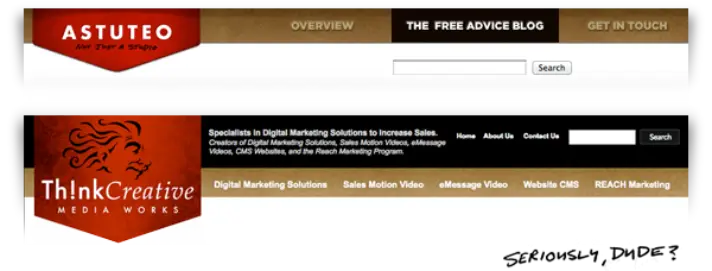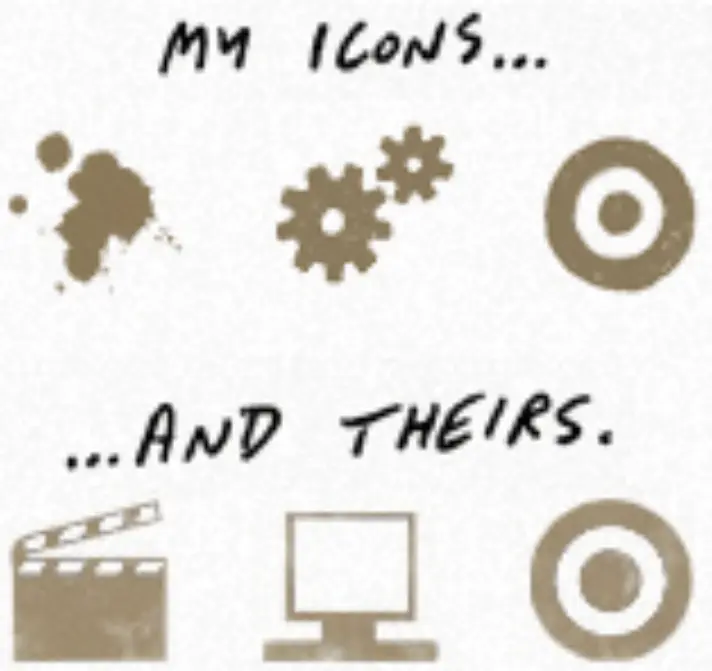Hey, You Stole My Website Design!
Tooling around the web the other day, I happened upon an interesting company. I noticed them right away because said company and I offer very similar services – graphic design, web development, and online marketing. Their being headquartered in nearby St. Cloud, MN, also caught my eye, considering I have some pretty great clients of my own in that area. To put it mildly, I was captivated by their unabashed style, irreverent attitude, and overall creativmarketyness.
Well, that, and they stole my website design.

Honestly, I wouldn't really care if some landscaping company in Texas appropriated a few elements my site design. But this is a different story entirely. Same design. Same line of work. Minnesota.
At the height of my irritation I also happened to notice their logo, Albert Einstein, his trademarked likeness no doubt also being used without permission (I guess when it rains copyright violations, it pours). Rather than stew about it, I happened to remember what Einstein himself once said: "In the middle of every difficulty lies opportunity."

Opting once again to make lemonade from life's lemons, I contacted a local intellectual property attorney, Beth Russell. Beth specializes in legal services for graphic designers and web developers and is author of one of my favorite resources, Art Law Conversations: A Surprisingly Readable Guide for Visual Artists. I asked Beth a few general questions and she was kind enough to let me publish her answers here. Please keep in mind, however, that Beth's comments are general in nature and are most certainly NOT legal advice. For advice specific to your situation, you must consult your own lawyer. (And unless you and she have a written agreement, Beth is not your lawyer!)
I have a copyright notice on every page of my website, but I've never registered anything with the United States Copyright Office. Do I have any ownership rights?
Beth Russell: Sure. When you create copyrightable material, your copyright exists the moment you put the work into a "fixed form." That is, for example: when you write it on paper, paint it on canvas, or record it in digital media. You don't have to register or use the notice to "get" a copyright.
There are really good reasons for choosing to register, though, and for choosing to use the copyright notice. (For one: you can't sue anybody for infringement until you've registered.)
Finally, before you go too far, seek counsel about what is and what is not eligible for copyright protection. There are a lot of rules that control "copyrightability" and you might be surprised to learn that just because you created it doesn't mean it qualifies for copyright protection.
My website design was ripped off and is being used by another company. Is there anything I can do to stop them?
Beth Russell: If you've registered the material that's being infringed, you could sue them.
You could also issue a "DMCA takedown request" to the company that hosts the infringing site. Under the law, online service providers (hosting companies, for example) are just as liable for copyright infringement as their users, when the user posts infringing material. If the hosting company has followed certain procedures set out in US copyright law, the company can qualify for "safe harbor" from such liability. Then, when the company receives a proper takedown request, it must actually take down the infringing material. So pursuing a takedown request with the offender's hosting company is another avenue you could pursue.
Always consult counsel before issuing a DMCA takedown request. For one thing, the hosting company has no obligation to remove the infringing material if your request is not in proper form. For another thing, if it turns out the offender was actually entitled to use the material (as, for example, if its use qualifies as "fair use," or the material is not sufficiently original to qualify for copyright protection or is otherwise in the public domain): you can be sued for issuing an inappropriate takedown request. So once again: always consult counsel before proceeding under the DMCA.
What can I do to protect my site design from copyright infringement in the future?
Beth Russell: The only thing you can actually do to protect against infringement is to employ technical measures that make it physically impossible. The real question is: "What can I do to put myself in the best legal position if/when infringement takes place?"
Once again, registering your material and using the copyright notice are your best defenses. Also make sure you have proper contracts in place with any contractors who created material for your site, to make sure you actually own the copyright to such material. (You do not acquire copyright rights, just because you paid somebody to create the material!)
There is no such thing, by the way, as a copyright for your website. When you register copyright for online material, you have to identify each individual element of the site that qualifies for copyright protection. For example: text, music, recordings, video, photographs, etc. Registering online material is (for that reason) more complicated than just registering single works. To read more about it, check out Circular 66 from the U.S. Copyright Office.
END INTERVIEW
Imitation, as they say, is the sincerest and most annoying form of flattery. Very true, especially when it comes to my one-year-old furiously hammering on the keyboard of my laptop. Destroy it or not, he just wants to be a frazzled MacBook-toting entrepreneur like his daddy. Who can blame him?
In most every other instance, however, the adage does not apply. In fact, it's no more consoling than my car being stolen because it's the hottest ride on the block (2002 Hyundai Elantra, ooo snap!) There are imitators and there are duplicators. Mimics and thieves. If you're gonna steal other people's hard work, good ideas, and fanciful designs, I'd recommend concealing it a little. From everybody.
Attorney Elizabeth Russell is the founder of Russell Law, providing experienced legal services for graphic designers, web developers, and other creative professionals. She's the author of the acclaimed Art Law Conversations: A Surprisingly Readable Guide for Visual Artists and frequently lectures on the topics of copyright and trademark law. You can learn more about Beth at her website and, of course, follow her on Twitter.